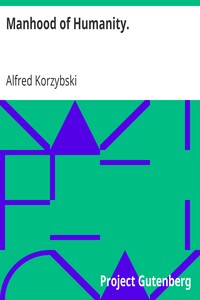| Summary |
"Manhood of Humanity" by Alfred Korzybski is a scientific publication written in the early 20th century. The work delves into the essence of humanity from a new perspective, focusing on the scientific and mathematical understanding of what it means to be human. Korzybski introduces the concept of "time-binding" as a defining characteristic that distinguishes humans from other forms of life, marking a critical examination of human nature and its implications for society. The opening of "Manhood of Humanity" sets the stage for Korzybski's exploration by asserting the need for a new science—Human Engineering—which aims to direct human energy toward the betterment of society. He addresses the misconceptions surrounding humanity, emphasizing that traditional views of humans as mere animals or as beings intertwined with the supernatural have impeded progress and understanding. Instead, he defines humans as "time-binders," emphasizing their unique capacity to accumulate, learn from, and utilize the experiences of past generations. This foundational understanding of humanity’s nature is posited as essential for achieving a cohesive and scientifically sound society, which can thrive through principles aligned with the inherent laws of human nature. (This is an automatically generated summary.)
|

